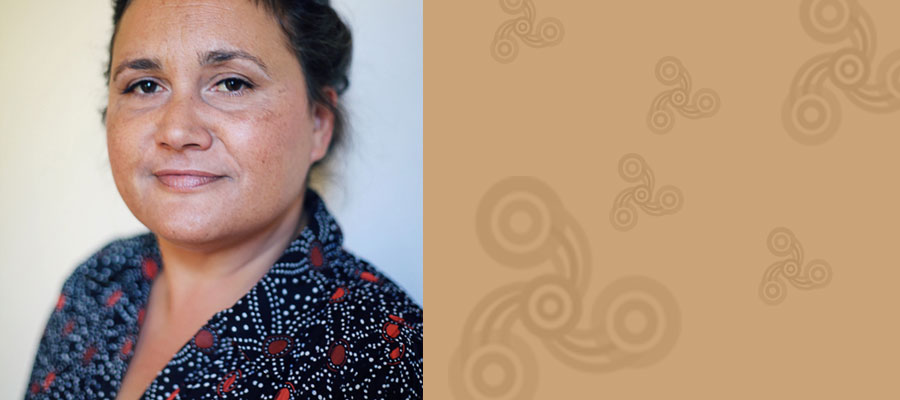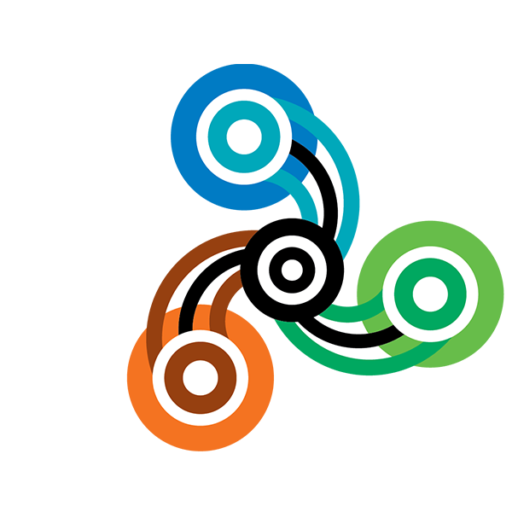
“Leadership to me is having insight, emotional intelligence, and learning your leadership quality over a long period of time, I think that once you have those values and those principals you can have longevity in your career.”
For Narungga, Wirangu and Wotjobaluk woman Lee-Ann Buckskin, community, culture and business are so intertwined that in her opinion, one could not exist without the other. Lee-Ann manages her own business, Lee-Ann Buckskin and Associates, working across the Indigenous arts, culture and events sector, and is also a Board Director of the governing council of the Australia Council for the Arts.
“Without community I wouldn’t have a business,” says Lee-Ann, “In my work I am a conduit for the community to be able to express themselves through an artistic medium and through their culture, that’s purely and simply what I do, my business is a not-for-profit basically, I’m not trying to make millions of dollars, that’s not what it’s about, I’m a service to the community.”
Lee-Ann has produced four Blak Nite Festival showcases, South Australia’s leading Indigenous Youth Arts showcase as part of the 2005-11 Come Out Festival, and The Australian Festival for Young People. She has also been awarded the inaugural South Australian Gladys Elphick Award recognising her work in the arts, as well as the prestigious internationally recognised Sidney Myer Facilitator Prize. In 2014, she and her colleagues won the South Australia’s Ruby Award for the design of the Aboriginal and Torres Strait Islander War Memorial in Adelaide, a project taking seven years in the making.
After beginning her career as trainee with the Adelaide Fringe Festival, Lee-Ann’s work in the Indigenous arts and culture sector has depended heavily upon her connections and relationships forged with various Indigenous communities, and while working at the community level can have its challenges, Lee-Ann believes that engagement with community and the community mindset is the greatest asset for Indigenous business people.
“You’re working democratically when you’re working on the ground with community,” says Lee-Ann. “There are many voices to making decisions and the ways in which projects can be executed, and the process can take a long time before you get to the first base of initiating a project and getting it off the ground, but I think that’s an asset, because business is also about relationship building, it’s about the strong relationships you have, so if I’m a conduit for artists and cultural expression, a strong relationship with community is imperative.”
Developing new pathways and opportunities for Indigenous artists, both locally and internationally, is a major component of Lee-Ann’s work. In October she will travel to South Africa to participate in the Colloquium & Creative Arts Lab, which will bring together a gathering of South African, Australian, Maori and US arts managers, directors, writers and experimental artists. The panel of artistic and creative thinkers will explore new ways of understanding and engaging with First Nations arts and its intersection with the national and international arts landscape.
“I work in arts and culture because I’m passionate about it, at the beginning of my career I had a real fire in my belly, I saw art and culture as a vehicle for change, I saw an opportunity for our nation to cherish ‘our’ First Nations art, culture and heritage. As a business person now I still have those qualities, what I realise too is that human society will always have arts and culture, and as a business person and unlike other industries I know my work will never run dry,” says Lee-Ann.
The theme for the 2016 Indigenous Business Month is ‘Celebrating Leadership’ – when asked about her thoughts on leadership, Lee-Ann says it’s all about making actions speak louder than words.
“I pride myself on my leadership and my career shows that in that I’ve had a healthy trajectory into the roles and leadership positions I have undertaken, I’ve earnt it the hard way, I’m a leader who gets their hands dirty, I think a leader is required to get their hands dirty and lead by example, you don’t sit back on your laurels, there a lot of people who talk their way through stuff but at the end of the day there’s no substance,” says Lee-Ann.
“Leadership to me is having insight, emotional intelligence, and learning your leadership quality over a long period of time, I think that once you have those values and those principals you can have longevity in your career.”
Lee-Ann also encourages Indigenous business people to take a more active approach to mentoring and developing the growth of future Indigenous business leaders and professionals.
“I’m really passionate about mentoring, if you’re a leader and have leadership skills then you should be mentoring somebody,” says Lee-Ann.
“That’s what we should be doing as leaders in an Indigenous context, taking young people or people emerging in their chosen careers and taking them under our wings, seeing a person’s potential and saying ‘come under my wing because I think you’ve got what it takes’, mentoring them in a way that builds their confidence and self-esteem, and seeing them take off in the word with confidence.”

Recent Comments